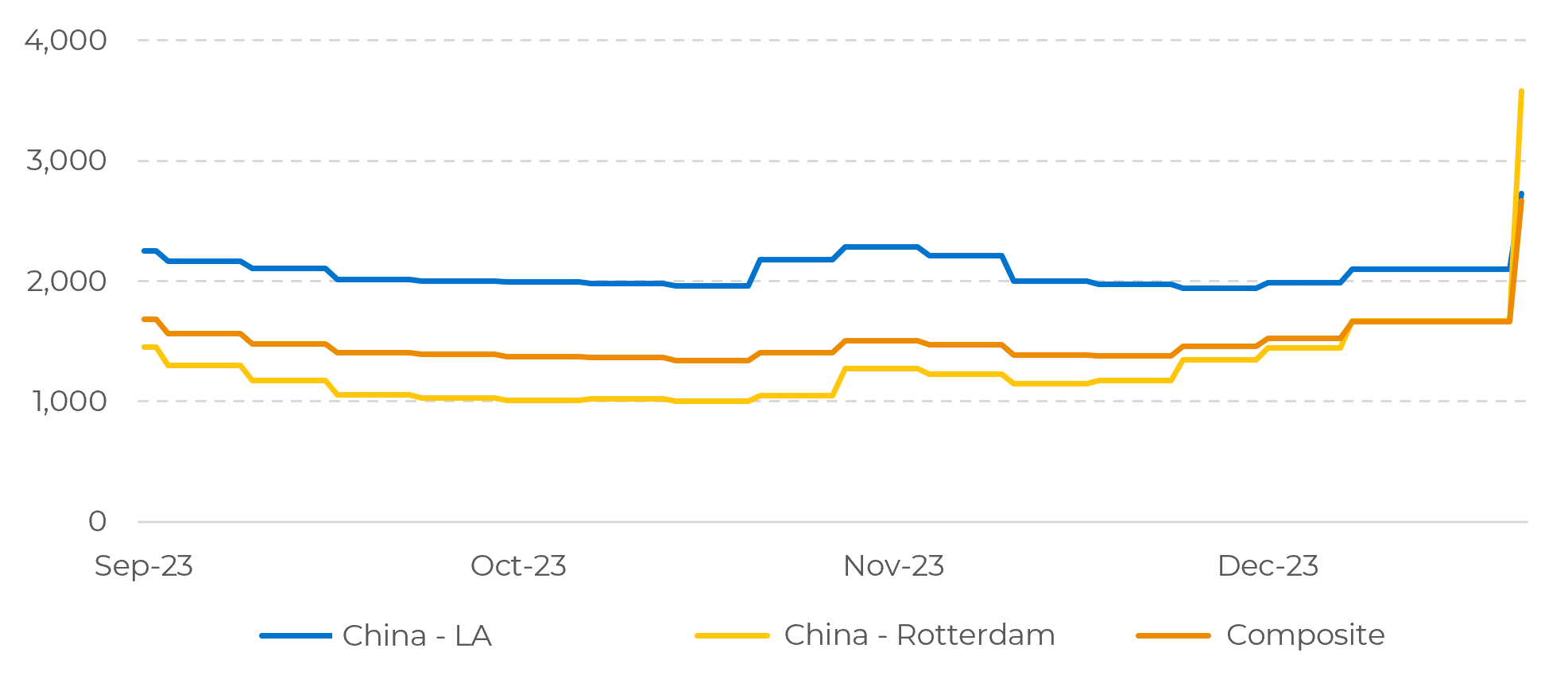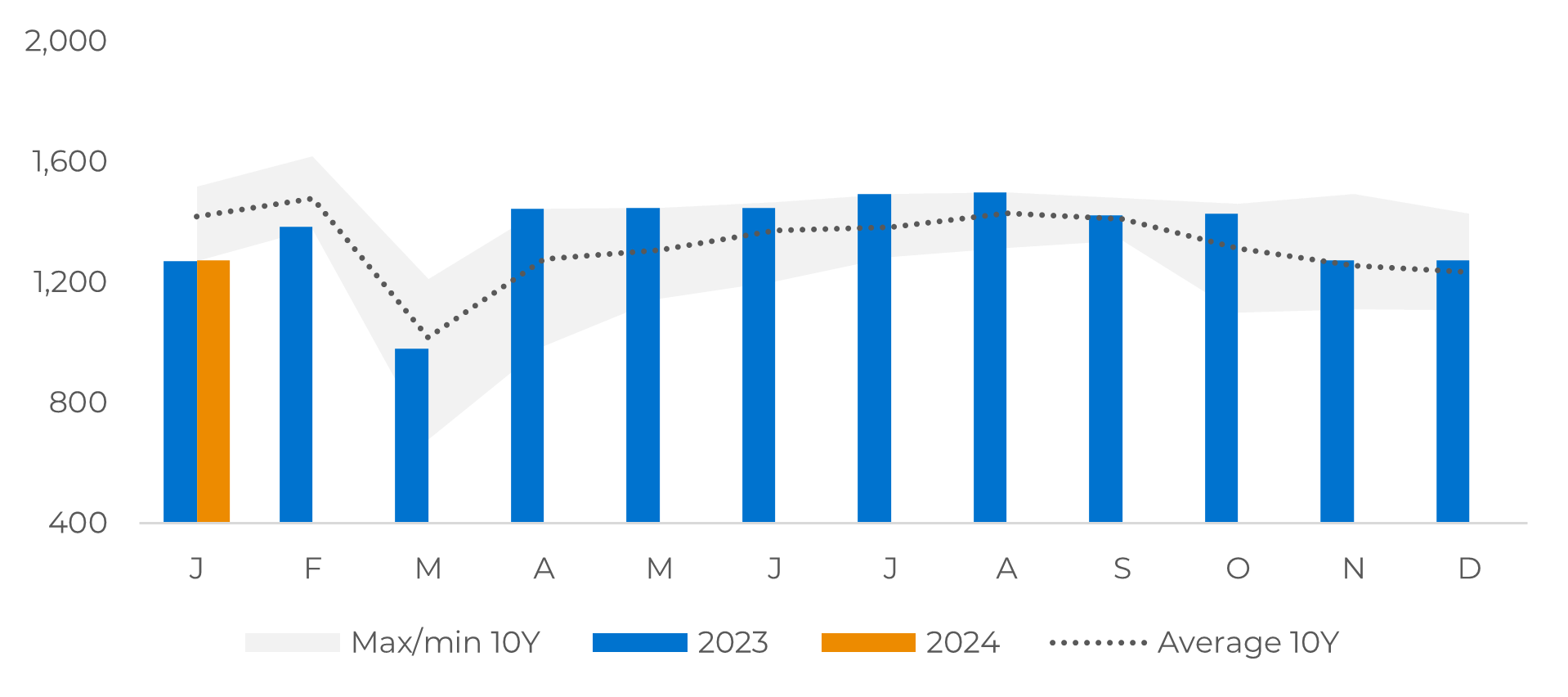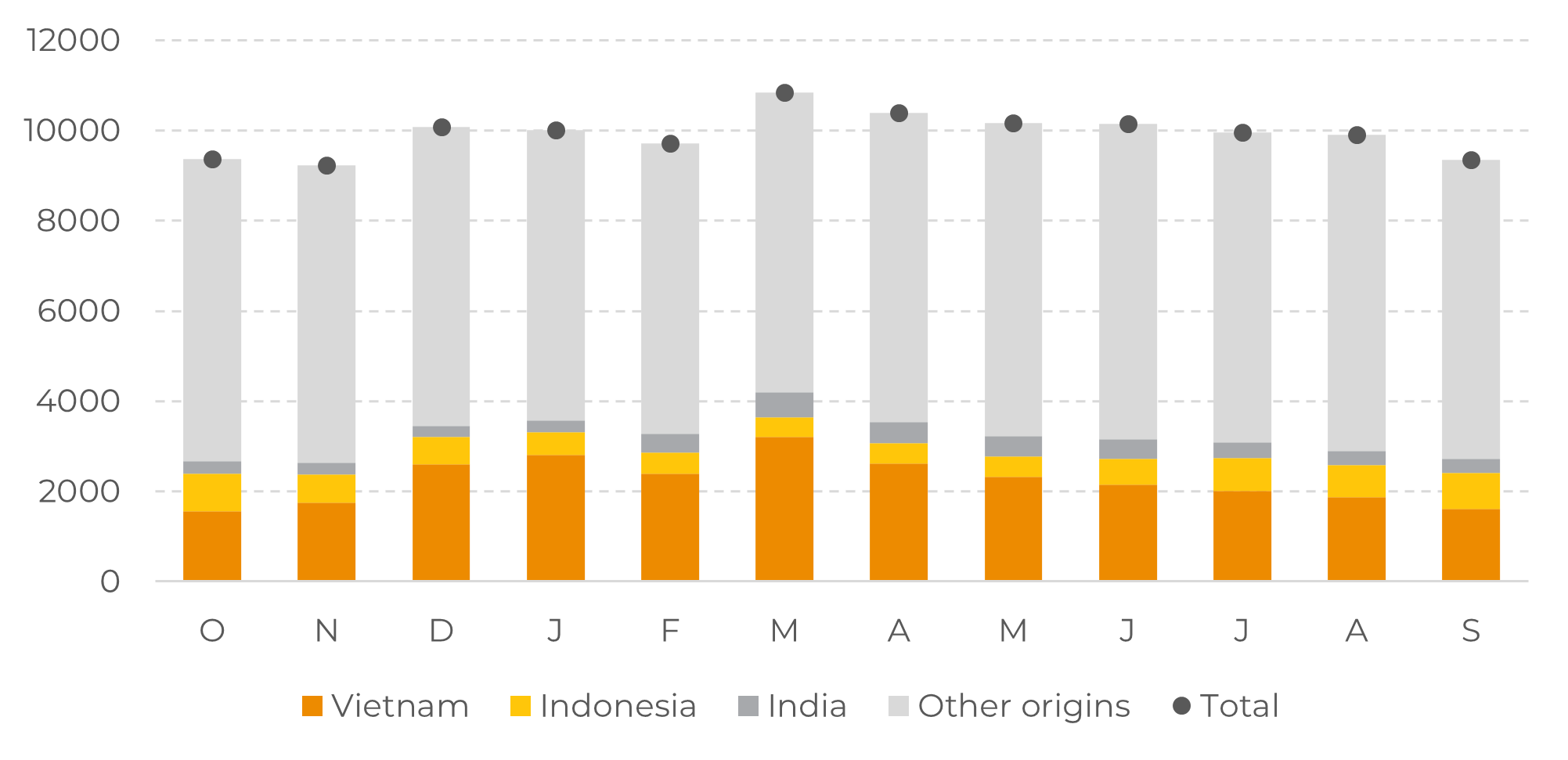
Jan 5
Coffee Weekly Report - 2024 01 05
Back to main blog page
- Global container rates surged 61% in the past two weeks to $2,670 per 40-foot container due to Red Sea tensions.
- Alternative routes, prompted by attacks, impacted Asia-to-Europe and US East Coast routes, absorbing excess capacity.
- Shanghai to Rotterdam and Genoa rates rose by 115%, helping carriers reach breakeven, but the strength is temporary, expected to decrease post-hostilities.
- Transpacific liner rates rose 56% to $2,769, impacting various industries, including potential delays in 36% of Q1 global coffee exports due to the Red Sea conflict.
- Escalation may also affect robusta prices, decrease NY-LN arbitrage, and trigger higher exports from Brazil and Uganda.
Global Container Rates Surge Amid Red Sea Tensions
Global container rates have surged due to rising tensions in the Red Sea, with a 61% increase over the past two weeks, reaching $2,670 per 40-foot container as of January 4, according to the World Container Index.
Attacks on marine vessels in the Red Sea have prompted ships to take longer alternative routes, impacting Asia-to-Europe and US East Coast routes, since the threat of attacks has led major container liners to pause Red Sea transits.
This rise has absorbed excess capacity in the market, leading to increased rates, particularly with Shanghai to Rotterdam and Genoa rates up by approximately 115%.
While these rates have helped carriers reach breakeven levels, the strength is considered temporary, expected to decrease once hostilities in the region subside and supply-demand imbalances widen.
Figure 1: WCI Spot Container Rate ($/FEU)

Source: WCI, Bloomberg Intelligence
Figure 2: Container Volume by Lane – Asia – Europe (‘000 TEUs)

Source: Bloomberg
In the transpacific route, liner rates surged by 56% sequentially to $2,769 per 40-foot container in the week ended January 3. Spot-rate volatility affects liner operators directly, but also has a cascading effect in commodity markets, also impacting railroads, truckers, freight forwarders, and intermodal marketers.
For coffee, the route affects mainly origins from Asia and Southeast Asia. Considering the three main exporters in the region (Vietnam, Indonesia, and India), roughly 36% of the first quarter global exports may be delayed – as the three countries represent approximately 11M bags from the 30.5M bags average that are exported during the first quarter of each year.
Further escalation of the conflict may add volatility to robusta prices, decreasing the NY-LN arbitrage. Additionally, other robusta-producing origins may see an increase in FOB differentials – such as Brazil and Uganda – as well as a trigger for higher exports in the first quarter, which would be supported by 23/24’s Brazil availability and the secondary harvest in Uganda.
Figure 3: Average Monthly Exports (‘000 bags)

Source: ICO, Vietnamese Customs, ICB, Bank of Indonesia
In Summary
Global container rates surged 61% in the past two weeks to $2,670 per 40-foot container due to Red Sea tensions. Attacks prompted alternative routes, impacting Asia-to-Europe and US East Coast routes, absorbing excess capacity. Shanghai to Rotterdam and Genoa rates rose by 115%.
Global container volume increased 9.3% YoY in October.
Transpacific liner rates rose 56% to $2,769, impacting various industries. The Red Sea conflict may delay 36% of Q1 global coffee exports. Escalation may impact robusta prices, decrease NY-LN arbitrage, and trigger higher exports from Brazil and Uganda.
Transpacific liner rates rose 56% to $2,769, impacting various industries. The Red Sea conflict may delay 36% of Q1 global coffee exports. Escalation may impact robusta prices, decrease NY-LN arbitrage, and trigger higher exports from Brazil and Uganda.
Weekly Report — Coffee
Written by Natália Gandolphi
natalia.gandolphi@hedgepointglobal.com
natalia.gandolphi@hedgepointglobal.com
Reviewed by Lívea Coda
livea.coda@hedgepointglobal.com
www.hedgepointglobal.com
Disclaimer
This document has been prepared by hEDGEpoint Global Markets LLC and its affiliates ("HPGM") exclusively for informational and instructional purposes, without the purpose of creating obligations or commitments with third parties, and is not intended to promote an offer, or solicitation of an offer, to sell or buy any securities or investment products. HPGM and its associates expressly disclaim any use of the information contained herein that may result in direct or indirect damage of any kind. If you have any questions that are not resolved in the first instance of contact with the client (client.services@hedgepointglobal.com), please contact our internal ombudsman channel (ouvidoria@hedgepointglobal.com) or 0800-878-8408 (for clients in Brazil only).
Contact us
hedgepointhub.support@hedgepointglobal.com
ouvidoria@hedgepointglobal.com
Funchal Street, 418, 18º floor - Vila Olímpia São Paulo, SP, Brasil
Check our general terms and important notices.
This page has been prepared by Hedgepoint Schweiz AG and its affiliates (“Hedgepoint”) solely for informational and instructional purposes, without the purpose of instituting obligations or commitments to third parties, nor is it intended to promote an offer, or solicitation of an offer of sale or purchase relating to any securities, commodities interests or investment products. Hedgepoint and its associates expressly disclaim any use of the information contained herein that directly or indirectly result in damages or damages of any kind. Information is obtained from sources which we believe to be reliable, but we do not warrant or guarantee the timeliness or accuracy of this information. The trading of commodities interests such as futures, options, and swaps involves substantial risk of loss and may not be suitable for all investors. You should carefully consider wither such trading is suitable for you in light of your financial condition. Past performance is not necessarily indicative of future results. Customers should rely on their own independent judgement and/or advisors before entering in any transaction.Hedgepoint does not provide legal, tax or accounting advice and you are responsible for seeking any such advice separately.Hedgepoint Schweiz AG is organized, incorporated, and existing under the laws of Switzerland, is filiated to ARIF, the Association Romande des Intermédiaires Financiers, which is a FINMA-authorized Self-Regulatory Organization. Hedgepoint Commodities LLC is organized, incorporated, and existing under the laws of the USA, and is authorized and regulated by the Commodity Futures Trading Commission (CFTC) and a member of the National Futures Association (NFA) to act as an Introducing Broker and Commodity Trading Advisor. HedgePoint Global Markets Limited is Regulated by the Dubai Financial Services Authority. The content is directed at Professional Clients and not Retail Clients. Hedgepoint Global Markets PTE. Ltd is organized, incorporated, and existing under the laws of Singapore, exempted from obtaining a financial services license as per the Second Schedule of the Securities and Futures (Licensing and Conduct of Business) Act, by the Monetary Authority of Singapore (MAS). Hedgepoint Global Markets DTVM Ltda. is authorized and regulated in Brazil by the Central Bank of Brazil (BCB) and the Brazilian Securities Commission (CVM). Hedgepoint Serviços Ltda. is organized, incorporated, and existing under the laws of Brazil. Hedgepoint Global Markets S.A. is organized, incorporated, and existing under the laws of Uruguay. In case of questions not resolved by the first instance of customer contact (client.services@Hedgepointglobal.com), please contact internal ombudsman channel (ombudsman@hedgepointglobal.com – global or ouvidoria@hedgepointglobal.com – Brazil only) or call 0800-8788408 (Brazil only).Integrity, ethics, and transparency are values that guide our culture. To further strengthen our practices, Hedgepoint has a whistleblower channel for employees and third-parties by e-mail ethicline@hedgepointglobal.com or forms Ethic Line – Hedgepoint Global Markets.Security note: All contacts with customers and partners are conducted exclusively through our domain @hedgepointglobal.com. Do not accept any information, bills, statements or requests from different domains and pay special attention to any variations in letters or spelling, as they may indicate a fraudulent situation.“HedgePoint” and the “HedgePoint” logo are marks for the exclusive use of HedgePoint and/or its affiliates. Use or reproduction is prohibited, unless expressly authorized by HedgePoint. Furthermore, the use of any other marks in this document has been authorized for identification purposes only. It does not, therefore, imply any rights of HedgePoint in these marks or imply endorsement, association or seal by the owners of these marks with HedgePoint or its affiliates.
We have updated our Terms & Conditions to reflect improvements to our platform, data handling practices, and the overall experience we provide to our clients.
To continue using the Hedgepoint HUB, please review and accept the updated terms.

